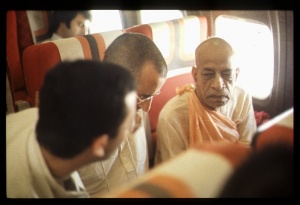SB 11.7.27: Difference between revisions
m (1 revision(s)) |
No edit summary |
||
| Line 1: | Line 1: | ||
{{info | {{info | ||
|speaker=King Yadu | |speaker=King Yadu | ||
|listener= | |listener=brāhmaṇa avadhūta | ||
}} | }} | ||
[[Category:Srimad-Bhagavatam - Canto 11 Chapter 07]] | |||
[[Category:Bhagavatam Verses Spoken by Yadu Maharaja - Vanisource|110727]] | |||
<div style="float:left">'''[[Srimad-Bhagavatam]] - [[SB 11|Eleventh Canto]] - [[SB 11.7: Lord Krsna Instructs Uddhava|Chapter 7: Lord Kṛṣṇa Instructs Uddhava]]'''</div> | |||
<div style="float:right">[[File:Go-previous.png|link=SB 11.7.26]] '''[[SB 11.7.26]] - [[SB 11.7.28]]''' [[File:Go-next.png|link=SB 11.7.28]]</div> | |||
{{RandomImage}} | |||
{{SBnotice}} | |||
==== TEXT 27 ==== | ==== TEXT 27 ==== | ||
<div | <div class="verse"> | ||
prāyo dharmārtha-kāmeṣu | :prāyo dharmārtha-kāmeṣu | ||
vivitsāyāṁ ca mānavāḥ | :vivitsāyāṁ ca mānavāḥ | ||
hetunaiva samīhanta | :hetunaiva samīhanta | ||
āyuṣo yaśasaḥ śriyaḥ | :āyuṣo yaśasaḥ śriyaḥ | ||
</div> | </div> | ||
| Line 17: | Line 22: | ||
==== SYNONYMS ==== | ==== SYNONYMS ==== | ||
<div | <div class="synonyms"> | ||
prāyaḥ—generally; dharma—in religiosity; artha—economic development; kāmeṣu—and sense gratification; vivitsāyām—in pursuit of spiritual knowledge; ca—also; mānavāḥ—human beings; hetunā—for the purpose; eva—indeed; samīhante—they endeavor; āyuṣaḥ—of long life; yaśasaḥ—fame; śriyaḥ—and material opulence. | prāyaḥ—generally; dharma—in religiosity; artha—economic development; kāmeṣu—and sense gratification; vivitsāyām—in pursuit of spiritual knowledge; ca—also; mānavāḥ—human beings; hetunā—for the purpose; eva—indeed; samīhante—they endeavor; āyuṣaḥ—of long life; yaśasaḥ—fame; śriyaḥ—and material opulence. | ||
</div> | </div> | ||
{{SBcollapse}} | |||
==== TRANSLATION ==== | ==== TRANSLATION ==== | ||
<div | <div class="translation"> | ||
Generally human beings work hard to cultivate religiosity, economic development, sense gratification and also knowledge of the soul, and their usual motive is to increase the duration of their lives, acquire fame and enjoy material opulence. | Generally human beings work hard to cultivate religiosity, economic development, sense gratification and also knowledge of the soul, and their usual motive is to increase the duration of their lives, acquire fame and enjoy material opulence. | ||
</div> | </div> | ||
| Line 31: | Line 36: | ||
==== PURPORT ==== | ==== PURPORT ==== | ||
<div | <div class="purport"> | ||
An intelligent person should understand that if there is an eternal soul different from the body, then real happiness must lie in our eternal situation, beyond the bondage of material nature. However, ordinary persons, even when discussing spiritual subject matters, generally desire to become famous or to increase their wealth and duration of life by such spiritual practices. Most common people think, for example, that the yoga system is meant for improving one's health, that one may pray to God for money, and that one's spiritual knowledge is meant for increasing one's prestige in society. Mahārāja Yadu wants to clarify that the young brāhmaṇa avadhūta is not like ordinary persons and that he is actually on a spiritual platform, as will be explained in the following verses. | An intelligent person should understand that if there is an eternal soul different from the body, then real happiness must lie in our eternal situation, beyond the bondage of material nature. However, ordinary persons, even when discussing spiritual subject matters, generally desire to become famous or to increase their wealth and duration of life by such spiritual practices. Most common people think, for example, that the ''yoga'' system is meant for improving one's health, that one may pray to God for money, and that one's spiritual knowledge is meant for increasing one's prestige in society. Mahārāja Yadu wants to clarify that the young ''brāhmaṇa avadhūta'' is not like ordinary persons and that he is actually on a spiritual platform, as will be explained in the following verses. | ||
</div> | </div> | ||
__NOTOC__ | </div> | ||
</div> | |||
<div style="float:right">[[File:Go-previous.png|link=SB 11.7.26]] '''[[SB 11.7.26]] - [[SB 11.7.28]]''' [[File:Go-next.png|link=SB 11.7.28]]</div> | |||
__NOTOC__ | |||
__NOEDITSECTION__ | |||
Revision as of 11:58, 23 June 2021

A.C. Bhaktivedanta Swami Prabhupada
Please note: The synonyms, translation and purport of this verse were composed by disciples of Śrīla Prabhupāda
TEXT 27
- prāyo dharmārtha-kāmeṣu
- vivitsāyāṁ ca mānavāḥ
- hetunaiva samīhanta
- āyuṣo yaśasaḥ śriyaḥ
SYNONYMS
prāyaḥ—generally; dharma—in religiosity; artha—economic development; kāmeṣu—and sense gratification; vivitsāyām—in pursuit of spiritual knowledge; ca—also; mānavāḥ—human beings; hetunā—for the purpose; eva—indeed; samīhante—they endeavor; āyuṣaḥ—of long life; yaśasaḥ—fame; śriyaḥ—and material opulence.
Translation and purport composed by disciples of Śrīla Prabhupāda
TRANSLATION
Generally human beings work hard to cultivate religiosity, economic development, sense gratification and also knowledge of the soul, and their usual motive is to increase the duration of their lives, acquire fame and enjoy material opulence.
PURPORT
An intelligent person should understand that if there is an eternal soul different from the body, then real happiness must lie in our eternal situation, beyond the bondage of material nature. However, ordinary persons, even when discussing spiritual subject matters, generally desire to become famous or to increase their wealth and duration of life by such spiritual practices. Most common people think, for example, that the yoga system is meant for improving one's health, that one may pray to God for money, and that one's spiritual knowledge is meant for increasing one's prestige in society. Mahārāja Yadu wants to clarify that the young brāhmaṇa avadhūta is not like ordinary persons and that he is actually on a spiritual platform, as will be explained in the following verses.